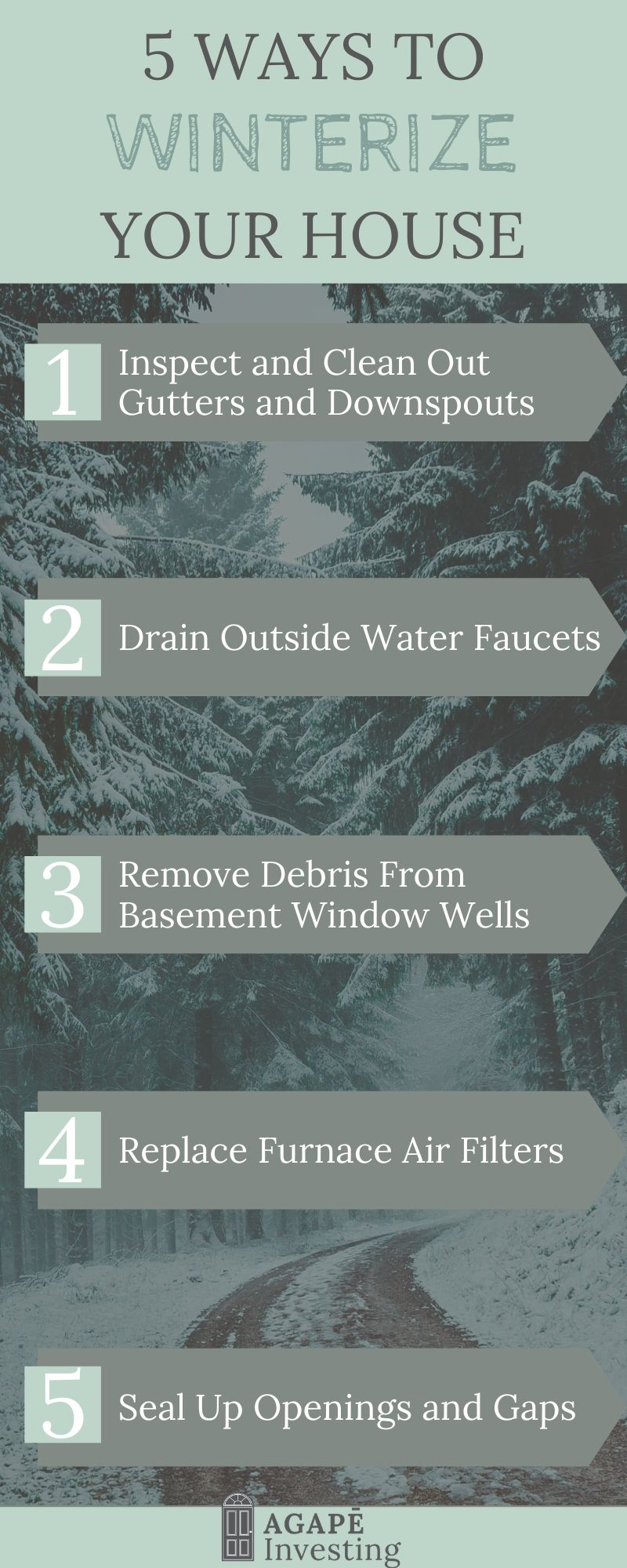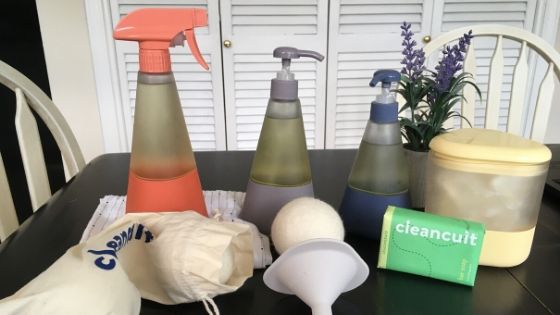5 Ways You Can Winterize Your Home
If you live in a location that experiences winter it is important that you prepare your home for the winter weather. Now that the cold weather is upon us, you will need to protect your home against the harsh conditions. Here are some home maintenance items you will want to complete to help protect your home. Find out 5 ways you can winterize your home.
A preventative home maintenance checklist for the winter.
Why Should You Winterize Your Home?
Preparing your home for the frigid weather is important. Some benefits from winterizing your home are staying warmer and using less energy. The big benefit comes from keeping your house in good condition in the long run.
Benefits of Winterizing Your Home
- Staying Warmer
- Using Less Energy
- Protecting Your House From Ice
- Protecting Your Family From the Cold
- Save Money Long Term
When you winterize your home every year helps to protect it from long term damage and expensive repairs.

This article may contain affiliate links. See our full disclosure here.
Related: How to Prepare You House for Halloween
5 maintenance tasks that we recommend you do to prepare your home for winter weather are:
- Inspect and Clean Out Gutters and Downspouts
- Drain Outside Water Faucets
- Remove Debris From Basement Window Wells
- Replace Furnace Air Filters
- Seal Up Openings and Gaps
INSPECT AND CLEAN OUT GUTTERS AND DOWNSPOUTS
Inspecting and cleaning out your gutters and downspouts is simple and a great way to prevent bigger problems from arising. The goal of cleaning out your gutters is to prevent water from pooling up next to your home’s foundation. Water can create problems including settling of the foundation, bulging basement walls, and moisture seepage. Water seepage is dangerous and can lead to cracks and mold.
Whether you clean the leaves from your roof gutters yourself or have a professional service do it for you, it is important that you inspect all of your downspouts to ensure that they are directing the rainwater from your gutters away from your home’s foundation.
Related: First Time Home Buyer’s Guide
Using A Leaf Blower
You can clean out your own gutters by using a leaf blower to remove all debris. This does require getting on the roof or a tall ladder in order to get the job done. Only attempt to do this yourself if you are able-bodied and have a secure roof do stand on.
Get a new leaf blowerGutter Extenders
The goal is to make sure that water isn’t pooling up against your home’s foundation. Make sure that gutters are dumping water at least 4 feet away from the house. You can achieve this range by adding a gutter extender to the downspouts.
Find gutter extenders herePrevent Gutter Blockage
To help prevent your gutters from getting clogged or blocked by leaves and debris, we recommend getting some gutter guards. They sit on top of your gutters to protect them from filling up with junk. This will also keep you from needing to clean them out regularly.
DRAIN OUTSIDE WATER FAUCETS
If you live in a region of the country where temperatures in the winter can go below freezing, then it is crucial that you shut off the water supply to your outside water faucets, and then drain all of the water out of them.
When water freezes it expands and exerts a tremendous force which can then fracture a steel valve. If your water supply is not turned off, and the faucet valve cracks, this can lead to a flood in your home.
It is also important to disconnect any hoses attached to your outside water faucets. If there is water in the hose that freezes it can expand back into your faucet valve and cause it to fail.
If you’d like to be extra cautious with your outdoor faucets, we recommend these insulated faucet covers.
Check out this article on how to drain your outside water faucets here: ‘Protecting Your Outside Water Faucets in the Winter’
Related: 7 Things You Should Stop Paying For
REMOVE DEBRIS FROM BASEMENT WINDOW WELLS
If you have a basement in your home with outside window wells, then it is important that you clean out all of the leaves and debris that have accumulated there. This is a crucial step to winterize your home.
Build-up inside of your window wells can lead to water seepage, pest infestations, rot, etc. November is a good time to clean out your window wells after the leaves are done falling.
Leaf bags help get the job done when cleaning out your window wells. Most trash services will also come to pick up yard waste, but we recommend checking with your trash pick up service to confirm.
Prevent Debris Pile Up
In order to prevent debris from piling up in your window wells, we recommend investing in some nice window well covers. These will help keep your window wells free of leaves, debris, animals, rain, snow, and cold.
Related: 3 Reasons To Consider Buying a House in the Winter
REPLACE AIR FILTERS & TEST FURNACE
With the cold temperatures brings more heating to our homes. This is a good time to start changing your furnace’s air filter. Changing your furnace’s air filter is important for two reasons:
1) Changing your air filter can save you up to $50/year in energy savings. A dirty air filter makes your furnace’s blower motor work harder and wastes energy.
2) Over time your furnace’s air filter gets clogged with the dust particles that it removes, and as such, as the filter gets blocked it can’t do its job of cleaning the air in your home. It will then be blowing out warm but dirty air throughout your house.
You can save money by buying furnace filters in bulk or by setting up recurring deliveries through Amazon.
Test Your Furnace Before the Winter
We highly recommend testing out your furnace before the winter begins. That way if there are any issues, you can catch them before heating your home is crucial.
Different Furnace Filter Sizes
There are a lot of different furnace filter sizes. Before purchasing your filters, be sure to check the size of your own furnace filters. If you get one that is too small for your furnace, it will not filter the air properly.

SEAL UP OPENINGS AND GAPS
Most doors and even some windows will have small gaps that let cold air into your home.
To prevent the cold weather from getting into your home, be sure to seal up all of your windows and doors with weather stripping. Weather stipping will help keep the cold from flooding the house and ultimately keep your gas and electric bills down.
When the cold comes into the house your furnace is working extra hard to keep your home at the set temperature on your thermostat. Taking the time to seal up any small openings will help keep you and your family warm this winter, as well as help save money.
What other winter home tips to you have to help prepare your house for the cold? Are there other things you do to winterize your home?
Don’t forget to winterize your home this year!

You May Also Like
Preparing Your House for a Safe Halloween
The Ultimate Preventative Home Maintenance Checklist
10 Things You Need to do Before Moving Into a New House
Eco-Friendly Cleaning Products That are Safe for Kids and Pets




Great tips Katie. Another thing we like to do is make sure rain barrels are emptied and stored. We forgot to do this one year and once the water froze it cracked the barrel and we had to replace it. In the summer rain barrels are great for catching rainwater runoff to water our garden with.
That is a fantastic tip! We don’t currently have any rain barrels, mainly because we don’t have a garden. But we plan to have a garden and get some rain barrels, so I will keep that little tip tucked away for when we do. Thanks for sharing!
Wonderful tips to prepare our homes for the winter! Thank you … ❤
Thanks for stopping by and reading!
Pingback: Preventative Home Maintenance (That Will Save You Money)